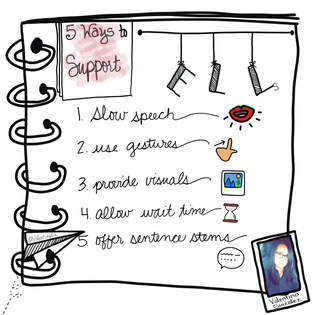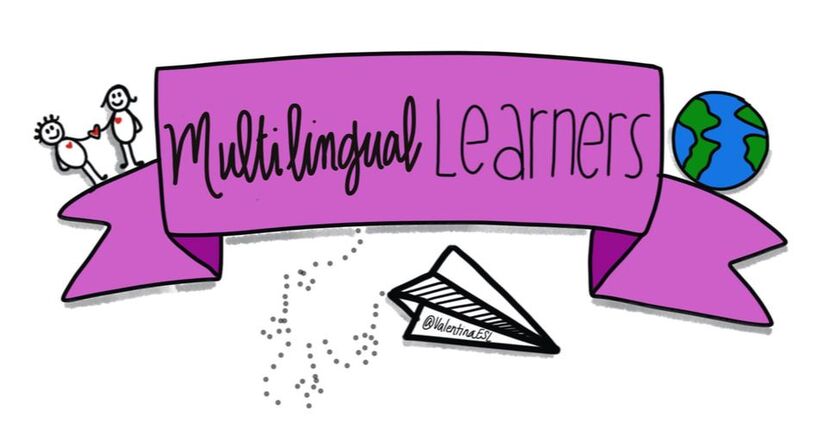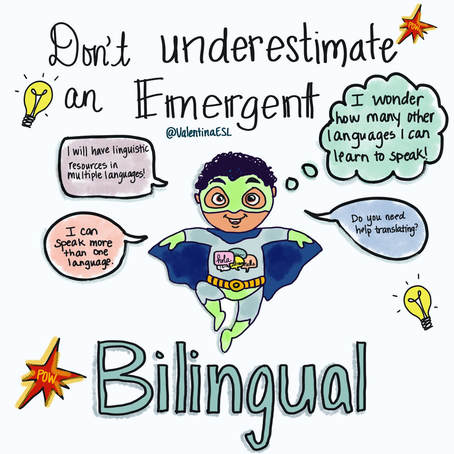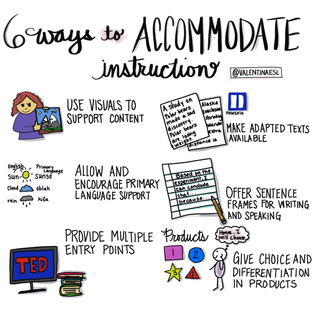|
Often I'm inspired to write by something I've encountered either through reading a professional book, visiting a campus or classroom, or through conversation (in person or online). This post was inspired by recent conversation online. Let me set it up for you. A teacher wanted advice regarding a student she has who is new to the United States. The student's primary language is Spanish and the teacher is having difficulty serving the student in a main stream English classroom while also serving the other English only students. The teacher mentioned that she had yet to have a conversation with the student. Many other teachers responded giving advice. Some said it's impossible to help this child. Others said that the student first must learn English before she can learn grade level content. Some said the other students in the class will suffer if the teacher employs techniques to support the one beginner. This post was completely deficit based and many of the comments to it really touched a nerve. "I see no benefit in having her..." So if you feel that you're in a similar situation or you know someone who is, here's some advice: 1. Communicate with the student even if you think you can't. Nonverbals go a long way and the fact that you try will show the child that you care. Smile. Warm eyes. Get to know the student and his/her passions as soon as possible so you can tap into them. 2. Find out how literate they are in their native language and begin using that as a leverage to learn English. Build on what they already know. NO child is a blank slate. Convey that to them because some kids feel very deflated when they come to a new country and can't understand the lessons right away. Reassure them that they will learn. That you will help them. 3. Find materials in their native language to support content learning in the beginning. Rewordify.com is a great platform that you can use to simplify text. Newsela offers adaptive texts in many content areas and they are highly engaging for all ages. NewsinLevels is another website that offers leveled texts. You can also translate texts using Google Translate. It's not always the most accurate, but if it's all that you have it's better than nothing.  4. Believe in your student and yourself. Set high expectations but give accommodations to level the linguistic playing field. Remember that a person who is cognitively capable of learning is does not need lower level materials. Your students who are learning English will need linguistic accommodation to have access to the same grade level standards that all other students have access to. Accommodations may include adapted texts, visuals (lots of visuals), support in native language (bilingual dictionaries), gestures, word banks, sentence frames, opportunities to hear peers and speak with peers using academic language, etc. 5. Talk with the ESL/ELD/ENL Specialist at your campus; however keep in mind that we are all teachers of language. We teach the language of our content. If you teach math, you teach the language of mathematics. If you teach science, you teach the language of science. Teaching English to English learners is everyone's responsibility. Building opportunities in each content area for listening, speaking, reading, and writing with appropriate scaffolds will assure that all students are gaining academic language.
6. The product may be different. Differentiation is a good thing! Remembering that access to the grade level standard is our goal, how it is expressed might look different. While some students may produce a typed report for example, others may do an oral presentation and some may create a visual representation. I think back to my own early years as a teacher. I, too, felt inadequate sometimes. I had students that I wasn't sure how to reach. I didn't know how to teach them. My own preservice education didn't provide me with the tools I needed to succeed. And my district wasn't offering the right type of professional development. At those moments, instead of leaning in, perhaps I pushed away. The good news is that at least today, now, we have venues like Twitter, Facebook, blogs, etc. to help us reach out and get help from colleagues. The bad news is that you might get some bad advice from some well intentioned friends. We have to weed out the advice and find experts in the fields. Some experts and leaders I continue to learn from: Larry Ferlazzo ColorinColorado Seidlitz Education SIOP Model
7 Comments
1/9/2019 10:35:17 am
First, kudos for using the term "emergent bilinguals" instead of ELLs. In my workshops, I have teachers draw a picture with their opposite hand. It can be fun but if we only focus on drawing with our opposite hands and ignore that we can draw with our other hand, it is overwhelming. I would not like to be called a "Left-handed learner." The goal should be to be ambidextrous. Likewise, the goal should be for our students to be bilingual--not just merely learn English.
Reply
Caryn Jones
1/27/2019 09:31:09 am
These are all helpful strategies. However, it brings up the perennial problem of time. Classroom teachers are inundated with tasks, but are rarely given enough time to complete them well. When your plate is full, the addition of an emerging culturally and linguistically diverse student can seem like a burden to even the most asset-based educator. Differentiation doesn't just happen and creating visuals and ways to assess learning for CLD students is incredibly time consuming.
Reply
valentina gonzalez
1/27/2019 11:07:40 am
Thank you for your comment, Caryn.
Reply
niloofar
1/27/2019 10:52:58 am
I am an ESL student, mother, and in class tutor ....Thank you for sharing your excrescences with us. My favorites from your article are number 1,2,and 4. Teachers in the suburbs are mostly white (women) without or less excrescences in other cultures....so, they are not comfortable to teach or discuss this matter in their classrooms...
Reply
valentina gonzalez
1/27/2019 11:09:13 am
You are right. We need more diversity amongst teachers in classrooms around our nation. Thank you for reading and for your feedback!
Reply
7/25/2020 10:35:12 am
Thanks for posting! I really like what you've acquired here; You should keep it up forever! Best of luck
Reply
7/29/2020 04:04:35 am
The article has really peaks my interest. I am going to bookmark your site and preserve checking for new information.
Reply
Your comment will be posted after it is approved.
Leave a Reply. |
Categories
All
|



 RSS Feed
RSS Feed
